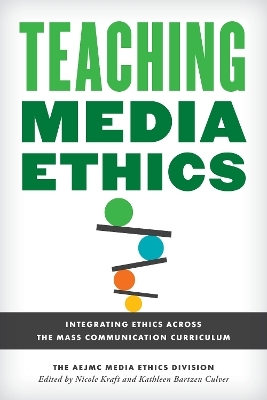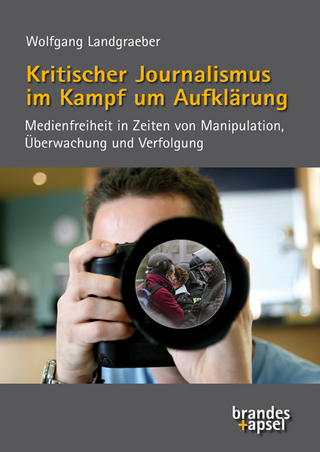
Teaching Media Ethics
Rowman & Littlefield (Verlag)
978-1-5381-8306-9 (ISBN)
The volume also includes nine chapters focused on key specializations, such as sports and social media, and critical issues, such as reporting on mental health. It offers thought-provoking chapters on diversifying the ethics curriculum, inclusive teaching practices and challenges to traditional notions of media ethics.
The only book of its kind in the realm of media ethics, this volume aims not to teach students directly but instead to “teach teachers” how to address ethics in their own classrooms and engage students effectively. It emphasizes practical advice and suggestions for activities and resources.
Teaching Media Ethics has something for instructors at all stages of their careers and should be particularly useful to graduate students and faculty who are developing their approaches to journalism and mass communication classes. The authors, leading ethicists and award-winning teachers, approached their chapters with an emphasis on making it as easy as possible to deliver teaching in ethics.
Nicole Kraft spent 25 years working as an award-winning journalist, as well as in professional sports and political communication before joining the Ohio State School of Communication in 2010. As an associate professor of clinical communication, she teaches Media Writing and Editing, Sports Journalism, Sports Media Relations, Feature Writing and Media Law and Ethics. In 2022 Nicole was honored with Ohio State’s Alumni Award for Distinguished Teaching and the Journalism Educators of America’s Linda S. Puntney Teacher Inspiration Award. In 2015 Kraft was inducted as an Apple Distinguished Educator and in 2022 she was inducted into the Ohio State Academy of Teaching. Kathleen Bartzen Culver is the James E. Burgess Chair in Journalism Ethics, an associate professor in the University of Wisconsin-Madison School of Journalism & Mass Communication and director of the Center for Journalism Ethics. Long interested in the implications of digital media on journalism and public interest communication, Culver integrates research, teaching and service to advance integrity in media. She also studies free expression, especially in campus contexts. She serves as visiting faculty for the Poynter Institute for Media Studies and was the founding editor of PBS MediaShift’s education section. Culver’s teaching portfolio includes media law, ethics, mass media practices and multimedia design. In 2021, she was named the Scripps Howard Journalism Teacher of the Year.
Introduction
Chapter 1: Media Ethics Defined, Patrick Lee Plaisance, Penn State University
Part I: Ethics at Every Level
Chapter 2: Undergraduate Media Ethics: An Introduction, Patrick Lee Plaisance, Penn State University
Chapter 3: Teaching Advanced Undergraduate Media Ethics, Patrick R. Johnson, University of Iowa
Chapter 4: Graduate Seminars in Media Ethics, Ryan J. Thomas, Washington State University
Chapter 5: Diversifying the Ethics Curriculum, Chad Painter, University of Dayton
Chapter 6: Inclusive Teaching as Ethical Practice, Patrick R. Johnson, University of Iowa
Part II: Ethics in Every Area of Study
Chapter 7: Developing a Combined Media Law and Ethics Course, Jack Breslin, Iona University
Chapter 8: Ethics in Introductory Reporting Courses, Lee Wilkins, University of Missouri and Wayne State University
Chapter 9: Ethics in Photography and Visuals, Alex Scott, University of Iowa
Chapter 10: Public Relations Ethics Education in Advanced Courses, Katie R. Place, Quinnipiac University; and Angela Zhang, University of Oklahoma
Chapter 11: Ethics in Broadcast News Classes, April Newton, Loyola University Maryland
Chapter 12: Ethics in Student Media, Nicole Kraft, The Ohio State University
Part III: Ethics in Specialized Topics
Chapter 13. Covering Law and Justice, Kathleen Culver, University of Wisconsin-Madison
Chapter 14: Data Ethics, Jasmine E. McNealy, University of Florida
Chapter 15: Sports Reporting, Nicole Kraft, The Ohio State University
Chapter 16: Digital Ethics, Julianne H. Newton, University of Oregon
Chapter 17: Relational Journalism, Paul S. Voakes, Paula Lynn Ellis, and Lori Bergen, University of Colorado
Chapter 18: Covering Mental Health, Suicide and Substance Use, Kathleen Culver, University of Wisconsin-Madison
Chapter 19: Social Media, Sheila Lalwani, University of Texas-Austin
Chapter 20: Science, Health and Environmental Journalism, Rhema Zlaten, Colorado Mesa Universitya
Chapter 21: Foreign Correspondence, Sheila Lalwani, University of Texas-Austin
Part IV: Ethics Beyond the Classroom
Chapter 22: Teaching the Ethics of Civic Journalism, Mark Poepsel, Southern Illinois
University-Edwardsville
Chapter 23: Media Ethics is for Everyone, Joseph Jones, West Virginia University
Index
About the Contributors
| Erscheinungsdatum | 23.11.2023 |
|---|---|
| Reihe/Serie | Master Class: Resources for Teaching Mass Communication |
| Zusatzinfo | 1 Tables |
| Verlagsort | Lanham, MD |
| Sprache | englisch |
| Maße | 158 x 236 mm |
| Gewicht | 490 g |
| Themenwelt | Sozialwissenschaften ► Kommunikation / Medien ► Journalistik |
| Sozialwissenschaften ► Kommunikation / Medien ► Kommunikationswissenschaft | |
| Sozialwissenschaften ► Pädagogik ► Erwachsenenbildung | |
| ISBN-10 | 1-5381-8306-4 / 1538183064 |
| ISBN-13 | 978-1-5381-8306-9 / 9781538183069 |
| Zustand | Neuware |
| Informationen gemäß Produktsicherheitsverordnung (GPSR) | |
| Haben Sie eine Frage zum Produkt? |
aus dem Bereich


